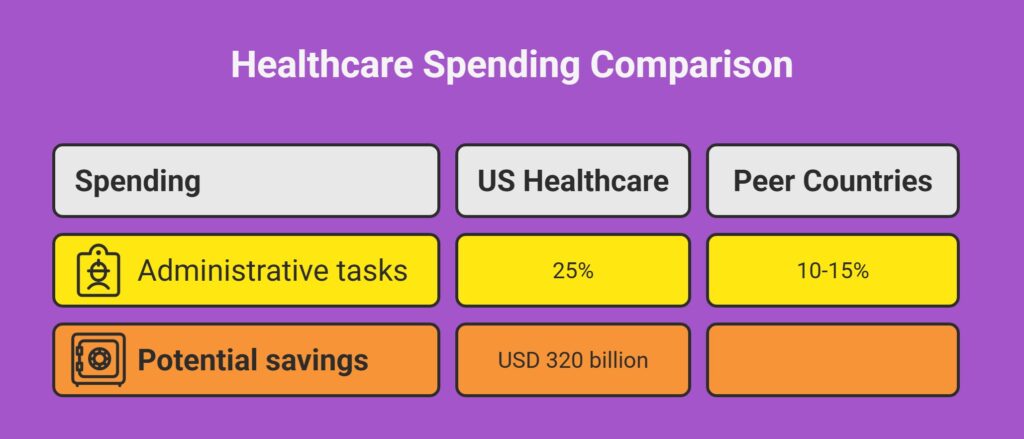Healthcare Revenue Cycle Management: A Complete Guide for Better Financial Health
15 Aug 2025 By: Maria Rush
Updated
Healthcare revenue cycle management, or RCM, is the end-to-end process that tracks a patient visit from scheduling and insurance verification to coding, claim submission, payment posting, and collecting any patient balance. It matters because small errors can delay or reduce payment. For example, if eligibility isn’t checked and the insurance ID is wrong, the claim may be denied, slowing cash flow and creating extra rework for staff.

What is Revenue Cycle Management in Healthcare
Think of healthcare revenue cycle management as everything that happens between your first patient contact and the moment you’ve been paid in full.
- Upfront work like patient registration, insurance checks, and getting pre-approvals.
- Middle steps like coding, charge capture, and submitting claims.
- Back-end work like posting payments, handling denials, and collecting patient balances.
Every step depends on the one before it. Miss something early? Say, a wrong insurance number and the whole thing slows down, or worse, stops.
Why Healthcare Revenue Cycle Management Matters
It’s not just about money. It’s about stability. When claims get delayed or denied, it slows down hiring, tech upgrades, even how many patients you can see.
It’s also about trust. Patients today expect upfront cost estimates, clear bills, and easy payment options. If you make that part hard, they’ll remember it more than the quality of care.
And let’s not forget compliance. Mistakes in documentation or coding don’t just cause payment delays. They can lead to fines, audits, and damaged reputation.

Key Steps in Healthcare Revenue Cycle Management
Here’s the flow that keeps your RCM healthy:
- Patient Registration & Scheduling – Get accurate info from the start. Avoid headaches later. Outsourced teams can keep this step consistent across every patient.
- Insurance Verification & Eligibility – Check coverage before the visit. Outsourcing can speed this up by using teams who handle multiple payer systems daily.
- Pre-authorization & Pre-certification – Approvals ahead of time mean you know you’ll get paid. Offshore billing specialists can chase these without adding to your in-house workload.
- Coding & Charge Entry – Accuracy = getting what you’ve earned without compliance issues. Outsourcing gives you certified coders who stay updated on regulation changes.
- Claim Submission & Processing – Clean claims move fast. Outsourced teams often use automated scrubbing tools to reduce errors.
- Payment Posting & Reconciliation – Match records to reality. Remote teams can post payments overnight, so your books are always up to date.
- Denials Management & Appeals – Recover lost revenue quickly and prevent repeat issues. Outsourcing can cut denial resolution times in half.
- Reporting & Optimization – Know your numbers so you can adjust fast. Some outsourcing partners provide dashboards with real-time analytics.
Common Challenges in Healthcare Revenue Cycle Management
Even when you have the steps down, things can still go sideways.
Payer Complexity
Every insurer has different rules. Miss one detail and your claim’s in limbo. Outsourced teams often already know the quirks of multiple payers.
Denials and Underpayments
Simple errors like a wrong code can cause rejections. Without a process to fix them fast, that money is gone. Offshore billing specialists often have dedicated denial units to handle this.
Staffing Gaps
RCM needs detail-oriented people. Staff turnover or limited training can slow the whole cycle down. Outsourcing fills those gaps instantly with trained replacements.
Patient Payments
High-deductible plans mean more patients owe more money. Remote call teams can follow up on balances without pulling your front desk away from new patients.
The Role of Technology

Technology doesn’t replace the work. It makes it faster and more accurate.
Connect EHR and Billing
Keeps data consistent. No more entering the same info twice.
Automate the Repetitive Stuff
Eligibility checks, claim scrubbing, and payment posting can all run automatically so your team can focus on the tricky cases.
Use Analytics
Know your denial rates, days in A/R, and payer performance so you can fix bottlenecks before they grow. Many outsourcing providers now offer these reports as part of their service.
Give Patients Tools
Online portals and mobile payment options mean easier payments and better collection rates. Outsourcing partners can manage these tools so patients get help using them when needed.
Trending Now: AI in Healthcare RCM
There’s a lot of talk about AI in healthcare revenue cycle management right now, and for good reason. A Yahoo Finance piece reports that the market is expected to jump from about $20.7 billion in 2024 to $180 billion by 2034. That’s an insane amount of growth in just 10 years. It’s not hype, either. More providers are using AI to speed up billing, reduce errors, and keep cash flow moving. At this rate, AI is going to be a normal part of RCM sooner than we think.
Where Outsourcing Fits In Healthcare Revenue Cycle Management
Some practices handle everything in-house. Others hand parts or all of RCM to outsourcing partners.
Outsourcing can give you:
- Experienced billing and coding specialists.
- Lower costs than hiring full-time staff.
- Established processes and tools you don’t have to build yourself.
- 24/7 coverage for after-hours tasks like payment posting or insurance follow-ups.
For smaller practices, outsourcing levels the playing field. You can run RCM at the same efficiency as a hospital without taking on the cost of a large internal team.
Conclusion
Healthcare revenue cycle management isn’t glamorous. But it’s the foundation of your practice’s financial health.
If you get the right people, the right process, and the right tools in place, you’ll spend less time worrying about payments and more time focusing on patients.
“Try to pick the areas where capital would be better invested for future growth. Right now, we’re investing a lot into our informational systems, patient portals and the upfront revenue cycle process.”
—John Gleckler, CFO of St. Vincent’s Medical Center in Bridgeport
And if managing it all in-house feels like too much? Talk to us at HelpSquad. We’ve got HIPAA-compliant healthcare outsourcing teams who can take the heavy RCM work off your plate. So you can run your practice without the financial headaches.


